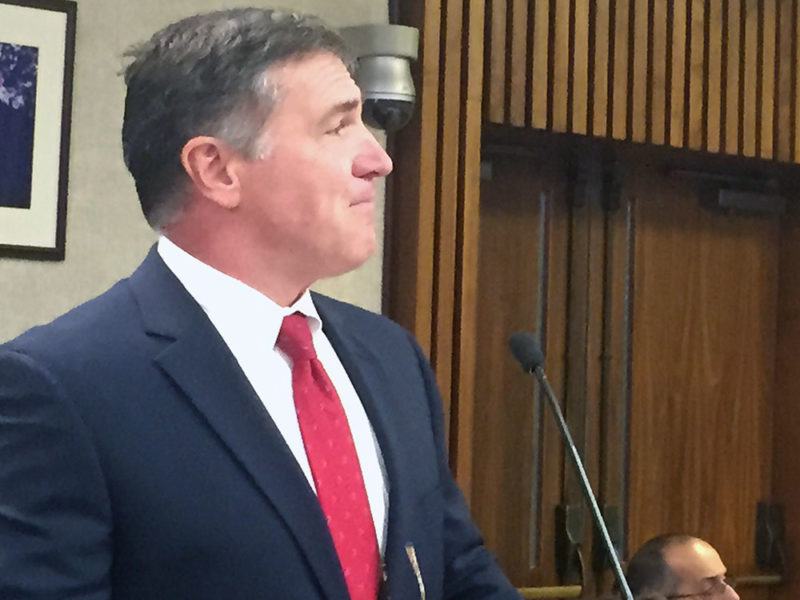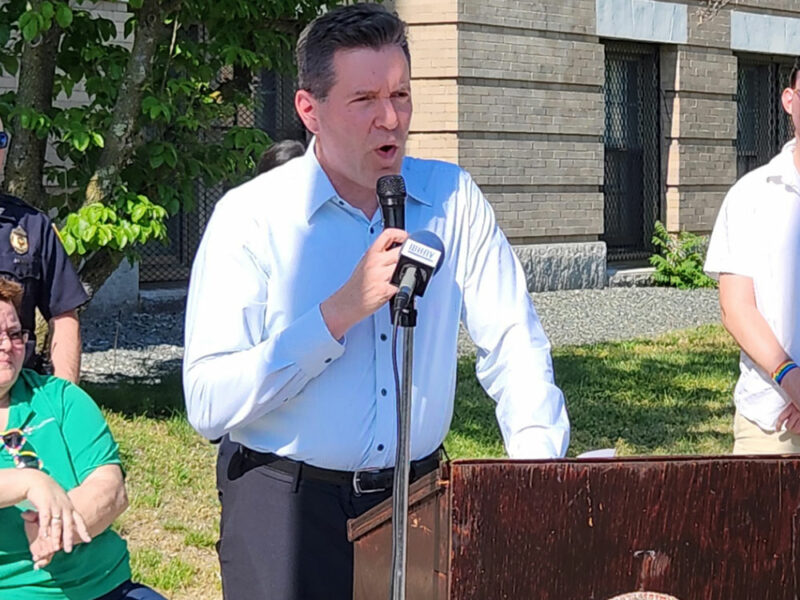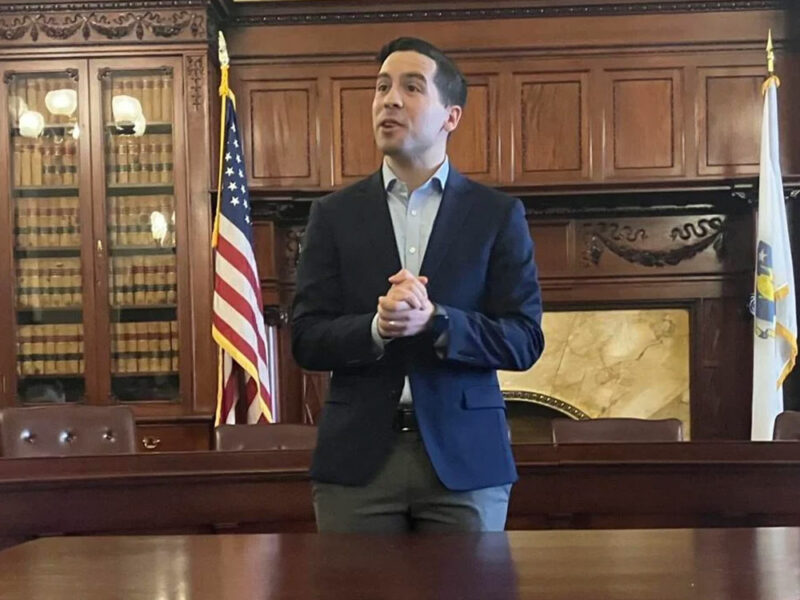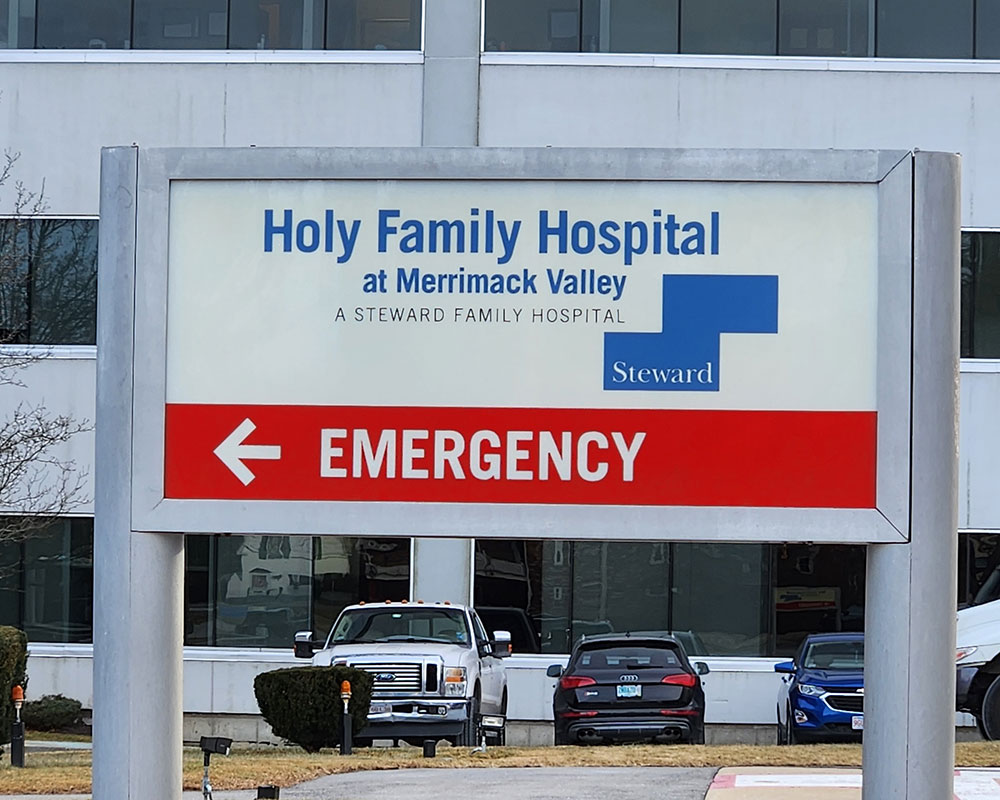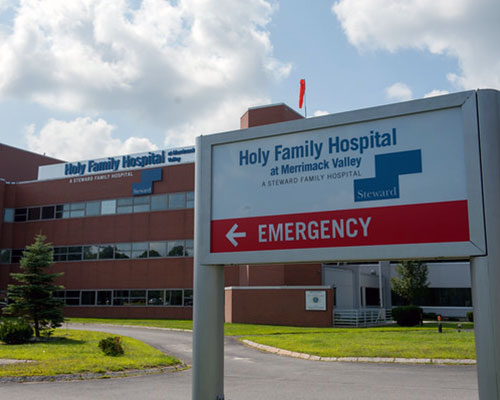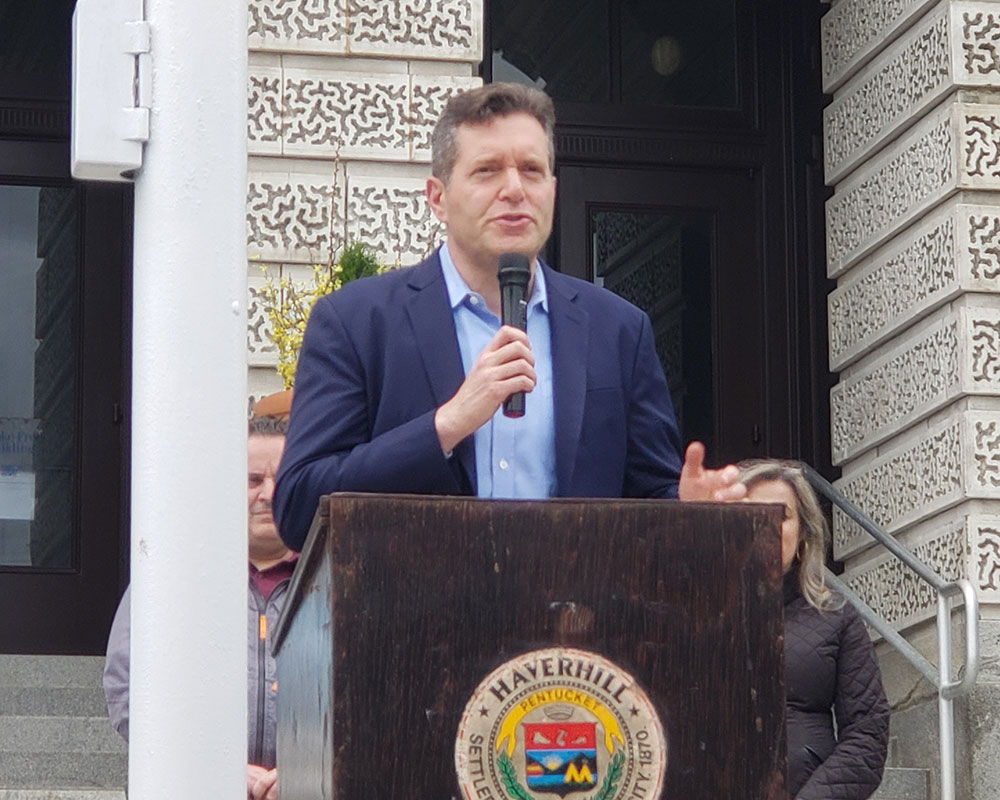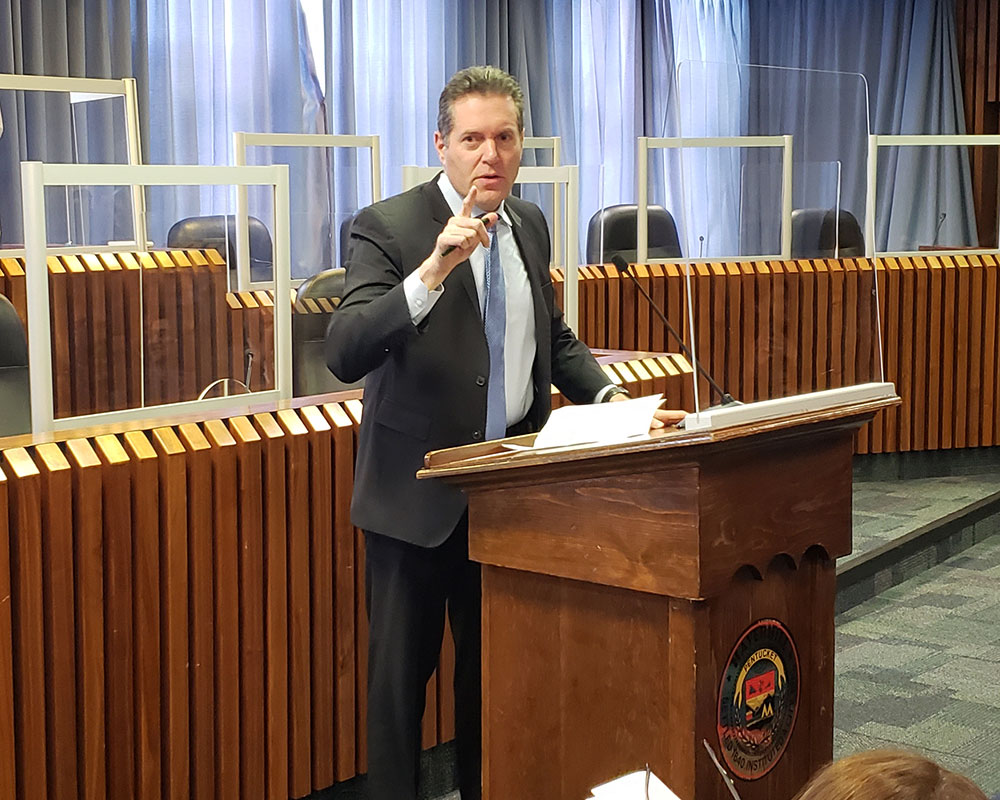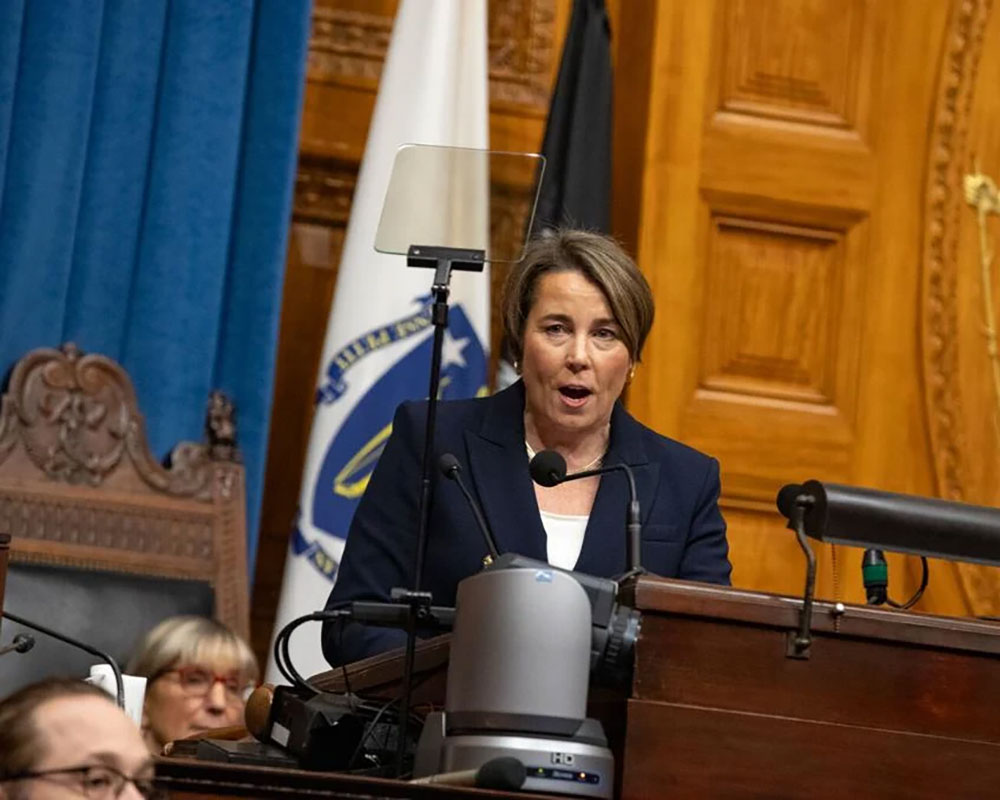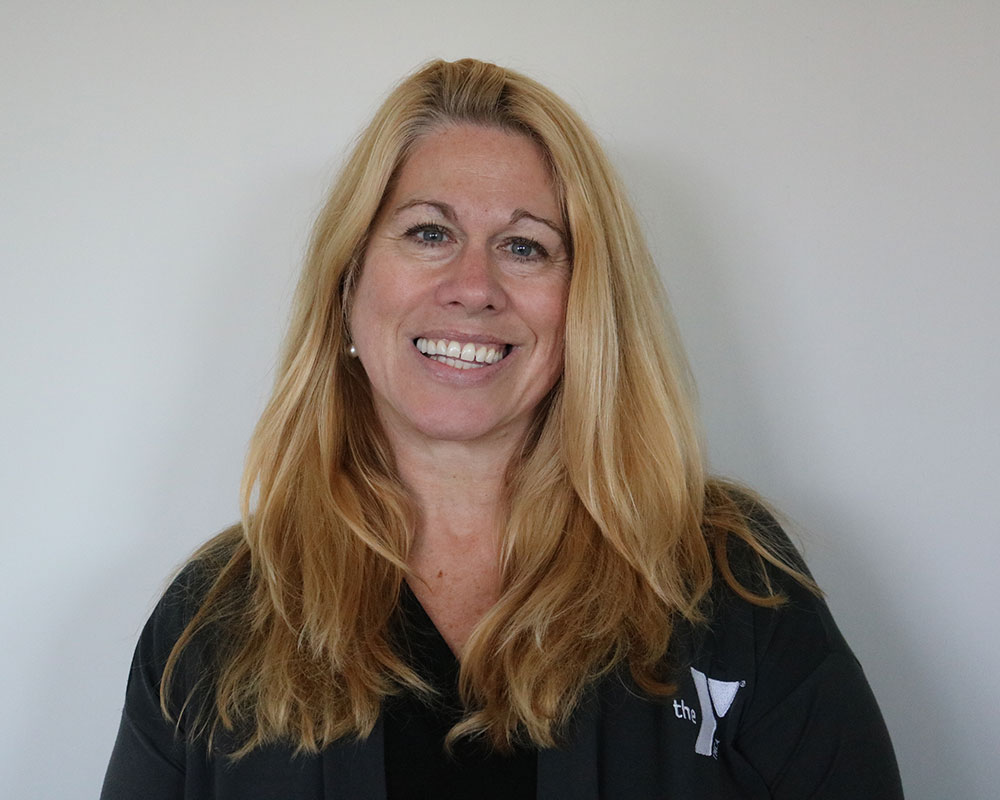Haverhill is receiving millions of dollars in state financing help for its sewer projects this year, while Groveland will be receiving state help upgrading its well water treatment. Haverhill Public Works Director Robert E. Ward told WHAV most of the help comes in the form of low-interest rate financing—previously around 1.5% on a 20-year loan, but there is also a small amount of loan forgiveness granted to communities. “It is still a low-interest loan, but there is a little bit of forgiveness. Every little bit helps,” he said. Haverhill sewer projects include South Mill Street Pump Station, $14.6 million of a $57 million upgrade; Locke Street work including combined sewer separation, $23 million; closure of the northern mound of Groveland Road landfill, $10.1 million; and cured-in-place-pipe trenchless lining in various locations, $2.3 million.
Beacon Hill News
Healey Threatens Steward Hospitals with Admission Freezes, Closing Beds if Demands Not Met by Friday
|
Gov. Maura Healey Tuesday released a list of demands—including financial records and safe staffing and supply levels—she said she is making of Steward Health Care, owner of Holy Family Hospitals in Haverhill and Methuen. Healey, in a letter sent to Steward CEO Ralph de la Torre, asked the chain to take a number of steps by Friday or face the state “freezing admissions, closing beds, canceling procedures and transferring patients to other hospitals.” One step asks Steward to produce financial records that are required of other health care systems, but that Steward has refused to submit for years.” The governor said information would show whether spending and resources might “put profits over patient care.”
“The time has come to move past our many months of discussions and begin executing a safe, orderly transition of your seven licensed facilities in Massachusetts to new operators as soon as possible,” the letter read. The governor went on to say, “For years, you have refused to engage in the same level of basic transparency that every other system in Massachusetts offers by not releasing your audited financial statements,” wrote Healey. “Your continued refusal to do so, particularly at this moment, is irresponsible and an affront to the patients, workers and communities that the Steward hospitals serve. It also leads to a further breakdown in trust and creates a major roadblock to our ability to work together to resolve this effectively.”
Steward disputed that the chain hasn’t provided financial data.
Beacon Hill News
Top House Leaders: No Steward Hospital Bailout, Taxpayers Already Gave $54 Million in COVID-19 Aid
|
Angered over the serious financial challenges at Steward Health Care that could jeopardize the future of safety net hospitals in eastern Massachusetts, top House Democrats insisted Thursday they will not bail out the company, while acknowledging the hospitals received $54 million in taxpayer money already. Steward, which owns Holy Family Hospital campuses in Haverhill and Methuen, said last week it doesn’t plan to shutter any facilities after securing a new funding stream. Criticizing past financing deals struck by Steward CEO Ralph de la Torre, House Speaker Ron Mariano and Ways and Means Chairman Rep. Aaron Michlewitz sounded dubious as they discussed the bridge funding deal touted by a Steward executive to stave off the feared hospital closures for now. Steward operates nine hospitals in Massachusetts, serving tens of thousands of patients including many low-income residents who have public health insurance coverage. “We are not in a financial position to commit to financing anything to bail these people out,” said Mariano, a Democrat from Quincy, where Steward closed Quincy Medical Center in 2014 due to multi-million-dollar losses.
Beacon Hill News
Sen. Finegold Lists Legislative Bills to Survive Deadline and Will Advance to Deliberations
|
More than a dozen bills championed by state Sen. Barry R. Finegold—ranging from studying the effectiveness of the Massachusetts School Building Authority to student and educator data privacy—will advance to debate in the state legislature. Finegold said the proposals survived a legislative procedure, known on Beacon Hill as “Joint Rule 10 Day,” a deadline for committees to pursue various proposals. “I’m looking forward to the work ahead on a wide range of issues from cybersecurity and data privacy to health insurance, access to care and economic development. Every one of these bills touches the lives of my constituents and I’ll be working hard with colleagues to see them passed into law.” said Finegold in a statement. Finegold represents Andover, Amesbury, Haverhill, Merrimac, North Andover, Tewksbury and Wilmington, and chairs the Joint Committee on Economic Development and Emerging Technologies.
Beacon Hill News
Finegold Bill Would Ban ‘Deepfake’ Depictions of Candidates or Political Committees
|
A law, proposed by Sen. Barry R. Finegold, that would ban phony depictions of candidates is headed for debate within a legislative subcommittee. The Senate Monday referred to the Committee on Election Laws, Finegold’s proposal to prohibit “Deceptive or fraudulent deepfake” media within 90 days of an election featuring the actual candidate or committee. A deepfake is defined as “synthetic media that depicts a candidate or political party with the intent to injure the reputation of the candidate or party or otherwise deceive a voter.” It would apply to any false image, audio or video. An example of such fraud come to light in advance of this week’s New Hampshire Presidential primary. New Hampshire Attorney General John M. Formella’s office said it received complaints about “a recorded message encouraging voters not to vote.” A press released reported, “Although the voice in the robocall sounds like the voice of President Biden, this message appears to be artificially generated based on initial indications.”
Those who violate the law would be subject to a penalty of up to $10,000.
Beacon Hill News
Gov. Healey Recognizes Haverhill Couple Who Benefited From State Affordable Housing
|
A Haverhill couple received special recognition Wednesday night when Massachusetts Gov. Maura Healey cited their success in buying a home as an example of how the state is addressing the shortage of affordable housing. During her first State of the Commonwealth speech before a joint session of the House and Senate, Healey introduced Abelardo Corona and Gabriela Amezcua. The governor noted they were connected with a MassHousing mortgage and MassDreams grant, which enabled them to buy a home in Haverhill. “Abelardo and Gabriela are here tonight from Haverhill, with their two beautiful children. He works in a factory and she’s an early educator.
Beacon Hill News
Gov. Healey Proposes Increasing Eligibility for Early Education and Child Care Assistance
|
More families in Gateway Cities, such as Haverhill, Methuen and Lawrence, would become eligible for early education and child care assistance under a plan proposed Tuesday by Gov. Maura Healey. Healey yesterday said she plans to pursue about $113 million in new child care spending in her fiscal year 2025 budget proposal, which will also request another $475 million in grants to continue supporting early education providers. The amounts come despite her administration’s muted forecast for state finances, pitching the spending as an economic and competitive necessity. Altogether, the governor outlined more than half a billion dollars she wants to deploy to help more Bay State families access and afford child care, particularly in lower-income areas and communities of color. “We recognize that the cost of child care is high, is out of reach for so many.
Beacon Hill News
State Senate Seeks to Tap Rainy Day Fund Interest to Meet Fed Matching Grant Rules
|
The Massachusetts Senate last week moved to put the interest on the state’s $8.2 billion rainy day fund to use to help the state and local communities better compete for federal grants. The bill, “An Act to provide for competitiveness and infrastructure investment in Massachusetts,” would help the state take compete for up to $17.5 billion through, what was called, “once-in-a-generation federal funding opportunities.” If also approved by the House, it would require the state comptroller to move the interest, now about $250 million annually, to the Commonwealth Federal Matching and Debt Reduction Funds. “I was proud to vote with Senate colleagues to strengthen Massachusetts competitiveness, ensuring the Commonwealth’s fiscal security. This legislation doubles down on our state’s fiscal responsibility while tactically investing in the Commonwealth’s future,” said Sen. Barry R. Finegold. Over the coming years, this bill is expected to unlock more than $800 million that could be used to pay for state or municipal match requirements for federal competitive grant opportunities, as well as planning work that will help communities prepare applications for federal grants.
Beacon Hill News
Haverhill YMCA Receives $160,000 State Grant to Help Kids Avoid Criminal Justice System
|
The Haverhill YMCA and two Lawrence-based organizations are among 67 organizations told Wednesday they are sharing in more than $15 million in grants through the state’s Community Empowerment and Reinvestment Program. The money is aimed at communities adversely impacted by the criminal justice system and poverty. Flexible operating grants are awarded to local teams for programming and projects that develop, strengthen and invest in community economic priorities. The Haverhill YMCA was awarded $160,000 to support the mental health and behavioral needs of at-risk youth, and to decrease their likelihood of engaging in risky behaviors such as substance abuse and criminal activity, through the Positive Alternative to School Suspension, or PASS, program. Gov. Maura Healey said, “The Community Empowerment and Reinvestment Program is reshaping our communities by providing resources for programs that strengthen our communities through job training, small business support, housing stability and more.”
YMCA’s PASS efforts provide an alternative to traditional suspension models by instead offering a therapeutic environment where students can access mental and behavioral health services to help them work through their issues to prevent further disciplinary occurrences.
